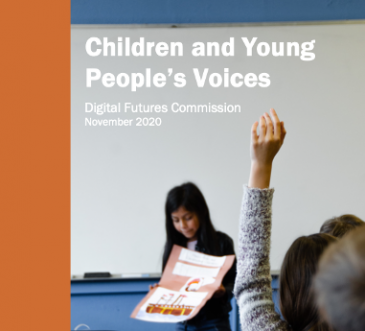Launching on World Children’s Day 2020, the Digital Futures Commission invites innovators, policymakers, researchers, and civil society to unlock digital innovation in the interests of children and young people. The work will be informed throughout by insights from children and young people themselves, and is geared toward real-world change for children, guided by the Commissioners and supported by 5Rights Foundation.

The work has begun by listening to what children and young people value about the digital world and the changes they call for. They have a lot to say, often thinking of the digital as ‘their domain’ and showing enthusiasm for the internet. But they also express frustration over their lack of agency regarding digital design, provision, regulation, and redress.
Our research agenda is organized around a series of problems linked to positive propositions. While the media, and many policy debates, are – rightly – full of concerns about what’s going wrong for children online, our aim in the Digital Futures Commission is to figure out what good looks like for children in a digital world and to develop inspiring yet practical ways of bringing this to fruition.
It seems deeply problematic to us that children get marginalized conceptually and practically when digital services are designed for the “general population” or “household.” The typical focus on the misleadingly-generic “internet user” renders children invisible in practical terms, including in “smart home” or “smart city” contexts, and in big data collected by the State or businesses. Insofar as services fail to address the needs and rights of their child users, child rights and safety advocates find themselves effortfully trying to retrofit finished products, child-blind regulations, and practices to address the worst problems.
By contrast, we seek to imagine digital futures (plural) for a public that includes children and does not bracket them off as an exception, problem, or afterthought. At the heart of the project is the ambition of embedding the best interests of children upstream in processes of innovation and design.
What do we mean by the best interests of the child? According to UNICEF:
“Best interests of the child—this applies to all actions and decisions concerning children and calls for active measures to respect their rights and promote their survival, growth, and well-being as children, as well as measures to support and assist parents and others who have day-to-day responsibility for realizing children’s rights.”
This quote comes from UNICEF’s Children’s Rights and Business Principles (2013), a document that brings together the best interests principle (article 3) of the UN Convention on the Rights of the Child (1989) with the UN Framework and Guiding Principles on Business and Human Rights (2011) which sets out States’ obligations to ensure that business meets its human rights responsibilities, including to children and young people.

It’s fascinating to reflect that none of these documents makes any mention of digital technology, notwithstanding their recency. Ensuring children’s best interests are met in a digital world therefore poses considerable challenges of understanding, expertise, and implementation.
Nonetheless, the core idea is simple: States, businesses, civil society must anticipate and address the needs and rights of children insofar as they might be affected by decisions being taken. However, the practice is far from simple. How can children’s best interests be taken into account by designers, providers, or processes of internet governance when it is often unknown whether a service user is a child, let alone their age or circumstances? Also, if society hasn’t managed to embed children’s best interests in the offline world, as the UN Committee on the Rights of the Child requires, how will it do so in a fast-evolving and highly diversified and unequal digital world?
Traditionally, decisions about children’s best interests are made for individual cases, knowing the circumstances. But digital service providers address users collectively, so systemic solutions are needed. To advance from problems towards solutions, the Digital Futures Commission will need to think carefully about children’s needs and rights, about digital innovation and associated business models, about processes of regulation and guidance for innovators. We are focusing on three areas – play in a digital world, beneficial uses of education data, and guidance for innovators – and engaging children and young people, stakeholders, and the public to reimagine the digital world that better serves children’s interests through processes of design-led, deliberative consultation.
We’re grounding our inquiry on the situation for children in the UK, so as to make our evidence and recommendations specific and actionable for particular stakeholders and circumstances. Our hope is that principles and recommendations will emerge of wider value, and we look forward to engaging with you. While the work will be child-centered and tech-focused, that’s not to say that we will necessarily prioritize the digital over the alternatives, nor position children and technology in a specialist silo. Rather, we aim to put child rights firmly on the agenda of the technologists, and children’s positive digital engagement on the agenda of regulators, the children’s workforce, and the public. After all, the digital world is the world, and children are its future.
 Sonia Livingstone DPhil (Oxon), FBA, FBPS, FAcSS, FRSA, OBE is a professor in the Department of Media and Communications at the London School of Economics and Political Science. She is the author of 20 books on children’s online opportunities and risks, including “The Class: Living and Learning in the Digital Age”. Sonia has advised the UK government, European Commission, European Parliament, Council of Europe, and other national and international organisations on children’s rights, risks, and safety in the digital age.
Sonia Livingstone DPhil (Oxon), FBA, FBPS, FAcSS, FRSA, OBE is a professor in the Department of Media and Communications at the London School of Economics and Political Science. She is the author of 20 books on children’s online opportunities and risks, including “The Class: Living and Learning in the Digital Age”. Sonia has advised the UK government, European Commission, European Parliament, Council of Europe, and other national and international organisations on children’s rights, risks, and safety in the digital age.
 Dr. Kruakae Pothong is a Researcher at 5Rights and visiting research fellow in the Department of Media and Communications at London School of Economics and Political Science. Her research spans the areas of human-computer interaction, digital ethics, data protection, internet, and other related policies. She specializes in designing social-technical research, using deliberative methods to elicit human values and expectations of technological advances, such as the Internet of Things (IoT) and distributed ledgers.
Dr. Kruakae Pothong is a Researcher at 5Rights and visiting research fellow in the Department of Media and Communications at London School of Economics and Political Science. Her research spans the areas of human-computer interaction, digital ethics, data protection, internet, and other related policies. She specializes in designing social-technical research, using deliberative methods to elicit human values and expectations of technological advances, such as the Internet of Things (IoT) and distributed ledgers.
For more, read Michael Preston’s statement about the Digital Futures Commission. »



